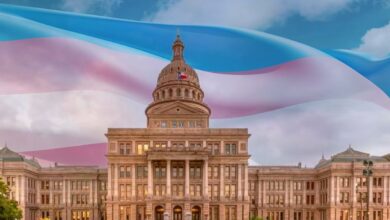
LGBTQ Advocates Brace for Special Session
Governor Greg Abbott has asked state lawmakers to revive anti-transgender legislation.
By Ryan Leach
Governor Greg Abbott has called a special session of the Texas Legislature to commence July 18 and end 30 days later, saddling lawmakers with an unprecedented 20 agenda items.
Among those items are “bathroom bills” targeting transgender people, as well as proposals that could undo local nondiscrimination protections for LGBTQ Texans in cities like Austin, Dallas, Fort Worth, and San Antonio.
Lieutenant Governor Dan Patrick, who presides over the Senate, is pushing hard for the bathroom bill, but House Speaker Joe Straus has taken a firm stance against it. The relationships among legislative leaders are growing ever more complicated, and LGBTQ Texans are right in the middle of it.
“I think you can take the speaker at his word,” said State Representative Garnet Coleman (D-Houston), who has represented the Montrose neighborhood since 1992. “Speaker Straus is a thoughtful individual, and this type of legislation does not represent his values.”
It was Coleman’s savvy political maneuvering during the regular session that killed an anti-trans bathroom amendment that the Senate had tacked on to one of his bills. Coleman said he doesn’t think the chances of anti-trans bathroom legislation passing in the special session are much better.
“These laws are not business-friendly, and I think most of us understand the value of diversity in Texas,” Coleman said. “The real problem with Austin is the civil war going on within the Republican Party. The litmus test for them is to see how crazy far to the right they can go. Some are willing to do that, but other members are bothered by that. The LGBTQ community, communities of color, and issues surrounding immigration are all balls in this croquet game they are playing.”
The issue for moderate Republicans who support Straus’ position is rooted more in the fiscal argument than the human-rights one. Anti-LGBTQ legislation has cost North Carolina and other states hundreds of millions of dollars in lost revenue and new jobs.
“CEOs and executives from across the nation have agreed that any type of discriminatory legislation will harm their ability to recruit new talent here in Texas,” said Senator Sylvia Garcia (D-Houston). “We already hear of conventions and companies not coming to Texas. The National Football League [NFL] has sent a warning that if a bathroom bill is enacted, they could keep Dallas out of the Super Bowl selection process.”
Last month, California banned publicly funded travel by State employees to Texas due to the passage of House Bill 3859, which gives Texas faith-based adoption and foster-care providers the ability to discriminate based on religious beliefs. This law was signed by Abbott shortly after the regular session concluded. Whether California’s ban will tamp down Republican enthusiasm for these types of laws during the special session remains to be seen.
During the regular session, which ended in May, the Senate staked out an early position by passing Senate Bill 6, their anti-trans bathroom bill similar to North Carolina’s House Bill 2.
SB 6 was sent to the House, where it languished and eventually died in a committee led by State Representative Byron Cook (R-Corsicana), one of Straus’ lieutenants. As the session drew to a close, the rhetoric between the two chambers intensified. At one point, the House attempted to compromise by approving a watered-down bathroom amendment, but it was rejected wholesale by the Senate because it didn’t go far enough to discriminate against the trans community. Ultimately, none of the legislation relating to bathrooms and municipal human-rights ordinances made it to the governor’s desk.
A special session will give Patrick and the obsequious Senate another opportunity. However, House Speaker Straus recently reiterated his pro-LGBTQ stance in a speech he gave to the Texas Association of School Boards: “I don’t exactly know what all the issues are with bathrooms in our schools, but I’m pretty sure you can handle them and that you have been handling them.”
Of course, neither the Senate nor the House will be required to pass any legislation. The only bill required to pass under the Texas Constitution is the budget, which was finalized before the regular session ended and has since been signed by the governor. It’s possible that either chamber could gavel out and bring the special session to an early end, but that isn’t likely. The House still sees public-education finance reform as a top priority, and the Senate wants to push through things like school vouchers.
In addition to LGBTQ allies under the capitol’s pink dome like Garcia and Coleman, advocacy groups like Equality Texas will return to the capitol to fight for LGBTQ equality in the special session.
“Equality Texas will not give up in our efforts to prevent the passage and enactment of any dangerous and immoral anti-transgender bathroom bill,” Equality Texas CEO Chuck Smith said. “We must mobilize the majority of Texans who support the fair and equal treatment of all Texas residents. We will need equality supporters to turn out in person at the capitol, and to make phone calls and send emails to decision makers. When we ask for help, please join us in this battle to prevent Texas from adopting a bathroom bill.”
This article appeared in the July 2017 edition of OutSmart Magazine.











Comments